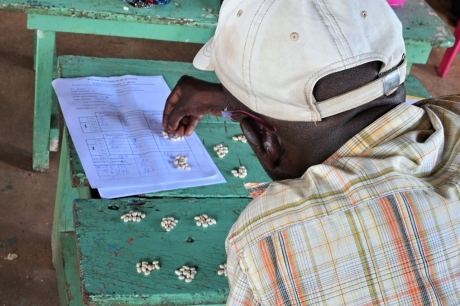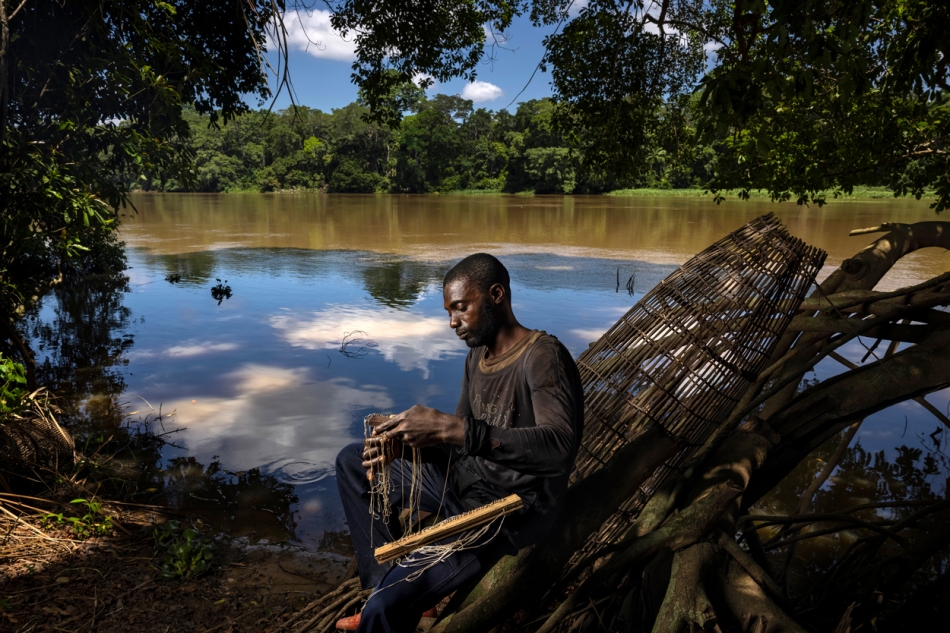
Hunters from the Kabo-Gbabali association play a game to enhance the understanding of what unsustainable hunting could do to future generations' food and incomes. ©FAO/Cindy Côté-Andreetti
The Congo Basin is the world’s second-largest rainforest after the Amazon. In Kabo village, deep in the Congo Basin, a group of men sit in a circle, playing a game. Taking turns, each of them takes some beans out of a small cloth bag. They watch each other and smile but nobody speaks – it is against the rules. As the game progresses, the beans in the bag rapidly run out and the players count up their haul.
In typical games, the person with the most beans by the end would be the winner. In this game though, all the players have lost.
That is because the beans represent wild animals; the bag is the forest, and the players are hunters. Once the bag is empty, they may each have a nice pile of beans (representing meat to eat and sell), but their means of earning a living and feeding their families is gone: the forest is empty.
This simple game is designed to enhance the understanding of what unsustainable hunting at a larger scale could do to future generations’ food and incomes.
The Bantu and Baaka Indigenous Peoples groups of Kabo and other nearby villages in the Congo have long relied on wild meat as their main source of protein and one of the few reliable ways to earn a living in this remote area. For some communities in the Congo Basin, the consumption of wild meat is estimated to cover between 60 and 80 per cent of daily protein needs.
Growing populations in the Congo’s towns and cities have rapidly increased the demand for wild meat. At the same time, porous borders with neighbouring countries have opened the way to illegal trafficking in animal species.
The resulting overhunting, combined with deforestation, pollution, diseases and climate change, has reduced the population of wild animal species in the Congo Basin.
“I used to find small animals like duikers and bushpigs easily in the forest. Now it’s more difficult,” says Jean Louis Pollo, a local hunter and player in the bean game. “I feed my family and support my children’s studies with hunting.”
How games can help solve problems
The collaborative “hunting game”, locally called Kuwinda Nyama, is only one innovative element of the Sustainable Wildlife Management (SWM) Programme, which is coordinated by the Food and Agriculture Organization of the United Nations (FAO), the Center for International Forestry Research and World Agroforestry (CIFOR-ICRAF), the French Agricultural Centre for International Development (CIRAD) and the Wildlife Conservation Society (WCS). The programme works to restore the balance between food security and wildlife conservation.
In subsequent rounds, the game becomes progressively more complex with multiple bags or bowls representing different sections of the forest and coloured beans representing various local species, both male and female. New beans are added when species are allowed the time to reproduce. The players are presented with various scenarios. They are first asked to work on their own; then they are encouraged to strategize together.
“Should we stick to hunting rodents (which breed fast) and have a moratorium on primates (which are slow to reproduce)?” they ask themselves.
If they work out a way to keep hunting while ensuring the bags fill up again, then the game is successful.
“Everyone gets absorbed in discussing ways to solve their hunting problems and how to win the game,” says Gracia Dorielle Ngohouani, a WCS sustainable hunting officer. “But at the same time, they are dealing with the serious issue of safeguarding wildlife resources for future generations.”
Strength in numbers
Having historically hunted on their own, 94 hunters are now taking hunting management decisions together as an association, with the support of the SWM Programme.
Led by Jean Louis, the hunters’ association is learning how to create inventories, monitor the numbers of hunted animals and agree on hunting rules, quotas and no-go areas, which are rotated to allow the wildlife populations to recover.
The association is currently trialling tracking systems. For example, members can indicate where and what they hunted by putting matchsticks in large boxes found throughout the village.
Leaders in sustainable wildlife management

In a country where the State is the owner of the forests and their natural resources, the long-term objective for the association is to obtain formal rights over the wildlife in their area and master the sustainable management of these animals.
“The SWM Programme strengthens the management capacities of rural communities and hunter associations in northern Congo for the sustainable and legal utilisation of wildlife and ecosystems while offering them better alternatives for food and nutritional security so that they become the best allies of the State in terms of nature conservation and rural development,” says Yannick Rasoarimanana, FAO Representative in the Congo.
The SWM Programme, which is funded by the European Union, with co-funding from the French Facility for Global Environment and the French Development Agency, has been working in close collaboration with the hunters’ association, government authorities and commercial logging companies to ensure the hunters’ rules and the needs of the community are taken into account.
At the same time, FAO is also working with the government on reforming a law on wildlife and protected areas to balance economic growth, consideration for local communities and environmental conservation.
“This partnership approach to wildlife conservation and sustainable use will help achieve a healthy and sustainable cohabitation between human beings, the environment and wildlife,” says Giacomo Durazzo, European Union Ambassador to the Republic of Congo.
The SWM Programme is also supporting rural populations to develop alternative sources of nutrition through the farming of poultry and small ruminants and encouraging their consumption in urban areas.
In the meantime, the hunting game has left a lasting impression.
“Where we used to hunt abusively, we will be aware that there are rules to be applied, and we will apply them,” says Jean-Louis. “I think that if we can do that, there will always be wild game in Kabo.”
Source: The FAO News and Media office, Rome
– global bihari bureau





